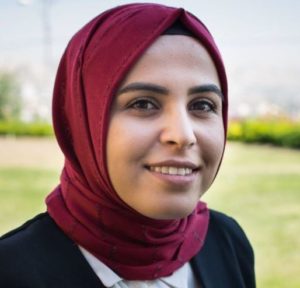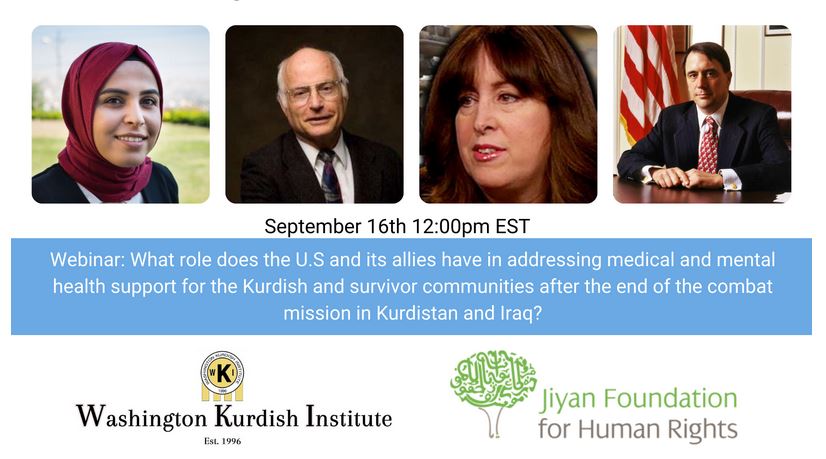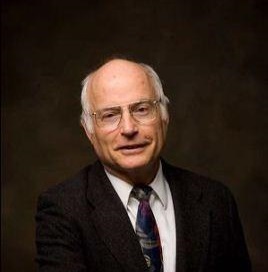Washington Kurdish Institute & Jiyan Foundation for Human Rights
September 16, 2021
On July 26, U.S. President Joe Biden announced that American troops would end their combat mission in Iraq by the end of 2021. The announcement left more questions than answers with many in fear about the political stability and the future of economic and infrastructure development in the region.
The Kurdish people have endured decades of genocide, rape, torture, forced religious conversion, and loss of loved ones to the Ba’ath Regime, ISIS, and multiple other terrorists. This panel will take a narrow look at how the United States and its allies can work with local governments to create programs that will provide necessary health, trauma, and mental care support for Kurdish people as they start to navigate post-conflict settings as a means of preventing future conflict in the region.
The psychotherapy and health programs at Jiyan Foundation for Human Rights address the root of post-conflict trauma and provide a roadmap to stability among various communities in Kurdistan, Northern Iraq, and Syria. Today Jiyan supports 9 treatment centers, a clinic for Yazidi women and families, a Healing Garden and mobile teams helping survivors in 11 refugee and IDP camps and nine regions throughout Kurdistan, Iraq, & Syria. Since 2005 these programs have supported over 100,000 survivors of trauma, terror, domestic violence and human rights violations in the region.”
The introduction of the event was done by the Chair of the Jiyan Foundation, Salah Ahmad, and the moderation of the event was carried out by Joshua Governale, Public Relations worker of the Jiyan Foundation.
The four panelists of the event were:
- Asmaa Ibrahim, Co-head of Trauma Care and Health at Jiyan Foundation for Human Rights and assistant lecturer at the Institute for Psychotherapy and Psychotraumatology at the University of Duhok in the Kurdistan Region of northern Iraq.
- Dr. Michael M. Gunter, professor of political science at Tennessee Technological University in Cookeville, Tennessee. Dr. Gunther is also the Secretary-General of the EU Turkey Civic Commission (EUTCC) headquartered in Brussels.
- Peter W. Galbraith, Vermont State Senator from 2011 to 2015. Mr. Galbraith is an author and former US diplomat. From 1993 to 1998, Galbraith served as the first US Ambassador to Croatia where he negotiated and signed the 1995 Erdut Agreement that ended the war in Croatia.
- Anne Speckhard, Ph.D, is an Adjunct Associate Professor of Psychiatry at Georgetown University Medical School and has also taught in the Security Studies Program of the School of Foreign Service at Georgetown University. She is the Director of the International Center for the Study of Violent Extremism (CSVE).
Salah Ahmad opened the panel’s discussion citing his personal history working with the people of Kurdistan, and the psychological damage the peoples of Iraq experienced throughout the many years of military conflict in his country. He emphasized his gratitude with how more academics and institutions are now focusing more on the mental health status of Iraqi citizens.
With his introduction, Dr. Gunther stated that the United States should undoubtedly continue its aid exports to local and international NGOs that operate in Kurdistan, as such policies should continue to succeed like the U.S. Marshall Plan. The bilateral relationship between the Kurds and the U.S. Government is strong, mainly because of what Dr. Gunther believes to be the Kurdish peoples’ “strong will for a nation”, and is the foundation of why U.S. economic and political investments to Kurdistan will continue.
He also continued to mention that the long history of atrocities against the Kurdish peoples, for instance the gas bombings from Saddam in Northern Iraq in 1988, as well as their forced removal from Iraq during Saddam’s invasion of Kuwait, the ISIL attacks against Kurdish civilians in 2014, and the Turkish invasions of Kurdish regions both in 2018 and 2019. Dr. Gunther noted that these events have long marked a history of intergenerational trauma, which has had damaging and lasting effects on all Kurdish peoples and Greater Kurdistan.
Asmaa Ibrahim noted Dr. Gunther’s discussion around intergenerational trauma, and supplied her personal experience of the events of Saddam Hussein’s campaign against the Kurds in Iraqi Kurdistan. She then compared the events of the 80’s and 90’s to the present, how Kurdish people have experienced genocide, rape torture, forced religious conversion, and loss of loved ones to the ISIL regimes during the 2010’s. Ibrahim fears that the possibility of the U.S. ending its combat mission would revert the region’s previous instability and allow ISIL to regain power and once again commit atrocities.
To counter this, Ibrahim believes that much more focus should be put into the mental health infrastructure of Iraqi Kurdistan, building up psychotherapy and additional health programs to address the roots of post-conflict trauma that many Kurdish peoples are still experiencing.
She stressed the importance of trauma-afflicted parents and how commonplace it is for their own children to absorb and recycle the trauma. Greater access to psychotherapists, medical doctors, lawyers, and social workers, must be expanded in Iraqi Kurdistan, Ibrahim said, as to tackle the trauma immediately before it can spill over into the next generation.
Mr. Galbraith opened with a similar recognition of the trauma that Kurdish peoples experienced during the Saddam gas bombings, as he interviewed the survivors of the chemical gas bombing and successfully convinced the U.S. Senate to sanction Saddam Hussein. He also was in Iraqi Kurdistan during the uprisings of 1991, and was forced to flee to the mountains with the Kurdish peoples during that time.
He noted the concerns of the Iraqi Kurdish people, with the possibility of their U.S. aid decreasing much like the policies towards Afghanistan in 2021, but Galbraith refuses to believe that the Kurdish peoples will experience a loss of U.S. commitment. This is primarily because it was Galbraith himself that introduced the plight of the Kurdish peoples decades ago to then Senator Joseph Biden, and such care for Kurdish security and aid is rooted in the Biden Administration’s foreign policy of the area.
Galbraith focused his closing remarks on how “human rights belong to the individual”, especially for instance his work with reuniting Yazidi mothers with their children, even though such processes caused many instances of tension with powerful local religious leaders. But Galbraith stressed that to truly encapsulate trauma, one must protect not only the past generation’s trauma victims, but the current generation as well. Yazidi female youth experienced mass slavery and abuse for over five years before certain populations were liberated, and Galbraith concluded that the most crucial factor to delineate trauma is to have compassion for the weakest of victims, no matter the circumstance.
Dr. Speckhard opened her statements recounting her work as a trauma psychologist, specifically interviewing over 800 terrorists, with 271 of those interviewees being from ISIS. She emphasized the magnitude of damage that ISIS forced onto the peoples of Syria and Iraq: Years of poverty, repressive regimes, sanctions, economic stress, terrorist activities, and war, which have all combined to create serious mental health issues for civilians of the region.
As an example, Dr. Speckhard referenced a 2017 study that carried out psychological assessments of 494 married couples in Syria, and the study concluded that approximately every couple had experienced at least one traumatic event, and 86% of respondents had experienced three or more events. She added that 60% of those interviewed displayed signs of PTSD.
Her primary concern is the mental health infrastructure of Iraq and the inaccessibility for many victims of trauma to begin healing will otherwise likely face relapse, loss of general focus, and the transfer of their trauma onto their children, much like what Asmaa Ibrahim had previously noted.
Dr. Speckhard believes that the necessary manner to address these issues is trauma-informed care executed via a systemic approach, but this process can only begin if the Iraqi and Syrian regions are stable. She called upon good governance to further prevent conflicts from rebel groups and Turkish-backed rebel groups, the latter of which she condemned for raping and torturing civilians to the present.
The process of prevention involves a society-wide approach, which means the rigorous training of teachers, religious leaders, psychologists, medical doctors, to recognize trauma and to intervene. The de-stigmatization of trauma processes is also a necessary development, but Dr. Speckhard mentioned that the normalization of trauma has already begun amongst certain populations, primarily because trauma has established itself to be applicable to most, if not all, Iraqi and Syrian communities.
Dr. Speckhard closed her remarks by stressing that more work must be done to educate Syrian and Iraqi youth on “the lies of jihad, about martyrdom, about hijra”, before they possibly re-contextualize their trauma and PTSD into joining and propagating terrorist groups. Dr. Speckhard also congratulated the Jiyan Foundation for all of the work that they have done in the study and care of traumatized youth.
For the Q & A Section, panelists were asked questions by the audience. Dr. Speckhard was asked how exactly the U.S. Department of State could expand their grants of aid to include communities affected by PTSD. Dr. Speckhard recalled her time working as a consultant of public affair grants at the U.S. Embassy in Baghdad, and the grant she was involved in worked with University of Baghdad Psychology professors travelling to Kurdistan classrooms and educating local Kurdish schoolteachers how to properly address trauma relapses and attacks from their schoolchildren.
When asked if local people are being educated to fill the needs of psycho-social professionals, Asmaa Ibrahim explained that the gap is currently far too wide to effectively address the mental health issues on the ground.
Ibrahim believes this issue to be a lack of government control and surveillance of the health job market, but Dr. Speckhard thinks that the root of the issue is rather that people recently graduated from health institutions should advertise themselves on the ground more than they are currently doing so at this time.
With the webinar’s closing remarks, Dr. Gunther thanked the Washington Kurdish Institute and the Jiyan Foundation for inviting him, and his fond memory for the founder of the WKI and his work in neurosurgery for the Kurdish peoples.
Asmaa Ibrahim also praised the Jiyan Foundation specifically for his focus on mental health lawyers and civil society organizations to truly begin producing change that will directly impact Kurdish trauma victims.
Mr. Galbraith concluded with the reassurement that the United States will not implement a policy of withdrawal in Kurdistan, and that aid to Kurdistan will most likely remain a strong part of U.S. foreign policy.
Dr. Speckhard emphasized both the importance of local and state mental health resources, but also the possibilities of outside mental health vendors to train and improve the mental health infrastructure from the ground-up.

Dr. Michael M. Gunter is a professor of political science at Tennessee Technological University in Cookeville, Tennessee. He also is the Secretary-General of the EU Turkey Civic Commission (EUTCC) headquartered in Brussels. In the past he taught courses for many years during the summer at the International University in Vienna, as well as courses on Kurdish and Middle Eastern politics, among others, for the U.S. Government Areas Studies Program and U.S. Department of State Foreign Service Institute in Washington, D.C. Dr. Gunter is the author of 10 critically praised scholarly books on the Kurdish question, and editor or co-editor of five more books on the Kurds, among others. He has also published numerous scholarly articles on the Kurds and many other issues in such leading scholarly periodicals such as the Middle East Journal, Middle East Policy, Middle East Quarterly, Critique: Critical Middle Eastern Studies, Orient, Journal of Muslim Minority Affairs, Maghreb Review, American Journal of International Law, International Organization, World Affairs, Journal of International Affairs (Columbia University).




